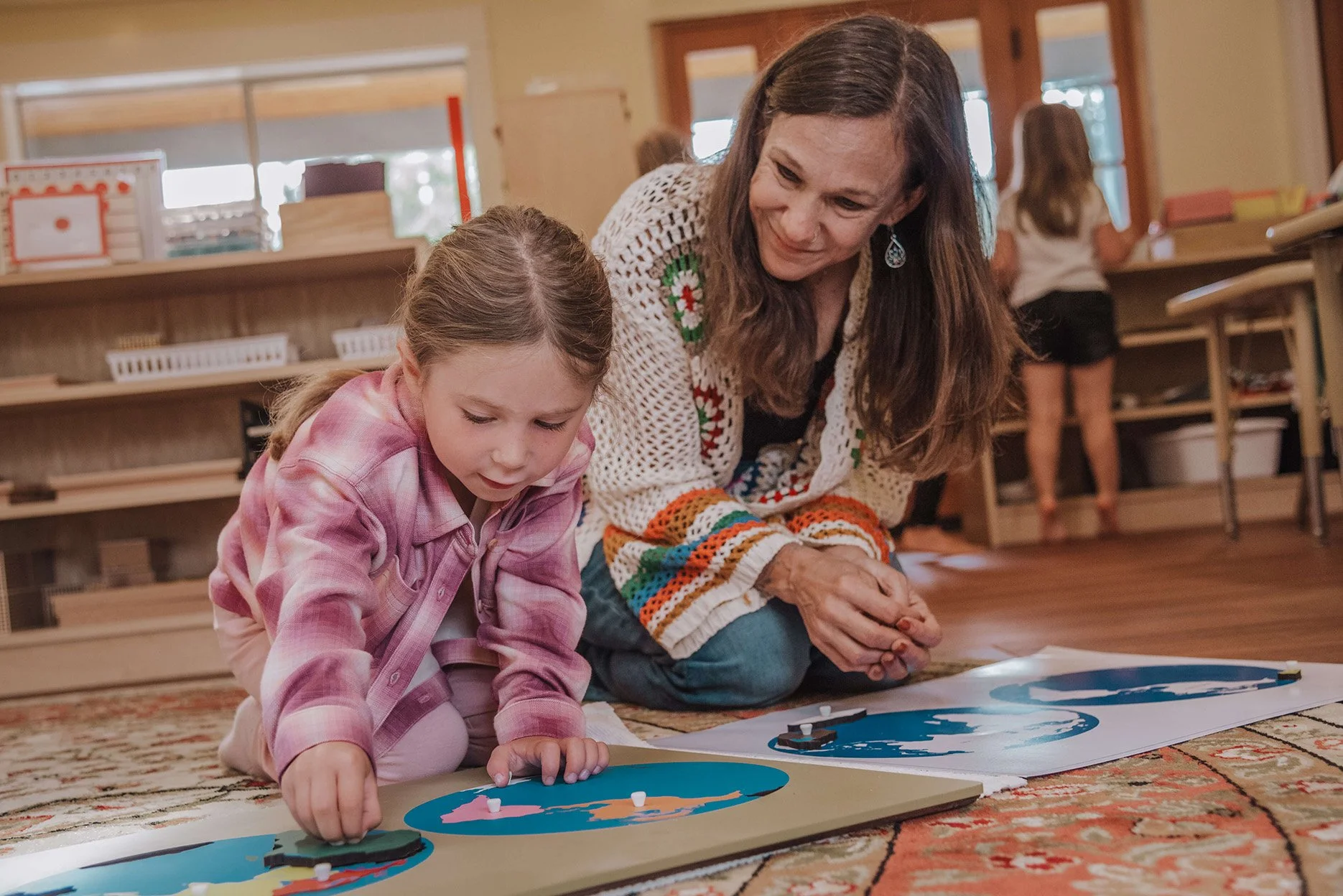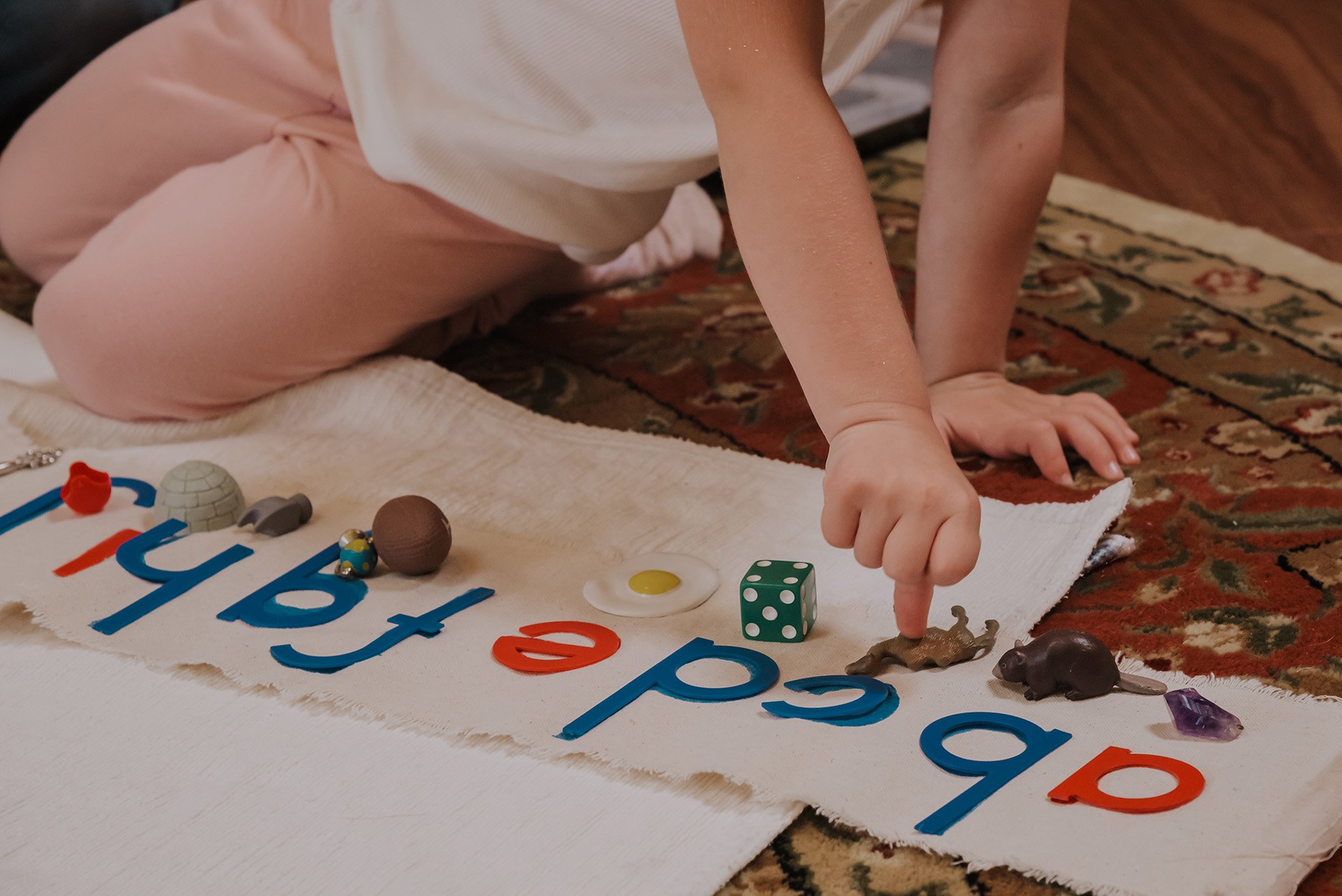A long legacy of
discovery and growth
With 30 years of Montessori experience and certification through the American Montessori Society, teacher Robyn Atkins has seen the profound impact Montessori education has on children and families. She is excited to open Grateful Grove Montessori and utilize her expertise in providing the best educational experience for families in the community.
-
In the Montessori classroom, children are educated through their senses, with learning experiences tailored to their individual needs and learning styles. The approach honors the distinct stages of development, allowing each child to learn at their own pace in an environment designed to foster independence, confidence, and curiosity.
The mixed-age Montessori classroom creates a dynamic environment where children can mentor peers, problem-solve, and form meaningful friendships. As students explore the classroom, they naturally apply and develop their social skills, with guidance from supportive teachers. This setup encourages collaboration, independence, and personal growth, creating a rich learning experience for all.
Highlights
Mixed-age groups promote collaboration among students
Uninterrupted work periods support focus and learning
Hands-on Montessori materials encourage active participation
Teacher tracking of student progress guides individualized learning
Shared scheduling fosters community, consistency, and optimal learning
The Montessori Method
-
Building Independence and Confidence
In the Practical Life area, children engage in hands-on activities that teach essential life skills like self-care, organization, and responsibility. These tasks—such as pouring, cleaning, dressing, and preparing food—help children develop fine motor skills, concentration, and coordination.
By practicing real-life tasks, children build independence, confidence, and a strong sense of order. The Practical Life area is designed to nurture self-discipline and prepare children for success in everyday life, fostering a love of learning and a deep sense of accomplishment.
At our Montessori school, we believe that learning through doing helps children gain the skills and confidence to take on the world.
-
Sharpening the Senses and Building Foundations
Montessori Sensorial materials help children refine their senses by encouraging them to observe their environment carefully, make intentional choices, and engage their whole body in learning. These hands-on tools stimulate exploration and discovery through activities like grading sounds, color exploration, and building three-dimensional structures.
Through these exercises, children develop critical math and reading skills, such as order, logic, and sequencing, while fostering concentration and attention to detail. By actively engaging their senses, children build a strong foundation for lifelong learning, laying the groundwork for both cognitive and creative development. -
Laying the Foundation for Literacy
Montessori language materials offer a carefully sequenced approach to developing essential literacy skills. Starting with vocabulary building, children progress through phonological and phonemic awareness, and on to early literacy skills.
Through hands-on, concrete materials, children learn to encode, decode, and explore blends, phonograms, and grammar—all while developing strong handwriting abilities. This method fosters a deep understanding of language, helping children build the critical foundation they need for reading and writing success. -
The Math area in a Montessori classroom begins with foundational skills like quantitative understanding and one-to-one correspondence, helping children grasp the concept of quantity. Through hands-on materials, children explore number recognition, odd and even numbers, sequencing, place value, and number operations.
This tactile approach allows children to develop correct number formation and build a solid foundation for all future mathematical learning, using their senses to understand math concepts deeply. -
Exploring the World Around Us
At our Montessori school, we provide a comprehensive education in science, nature, culture, history, art, and music, offering hands-on learning experiences across these rich areas. Children actively explore their world, discovering the differences between living and non-living things, plants and animals, and vertebrates and invertebrates.
Through the study of animals of the continents, biomes, and global celebrations, children develop a deep appreciation for the diversity of the world. In addition, they engage with history, exploring different time periods, historical figures, and key events that shaped our world.
Creativity is woven into the rhythm of each day in our Montessori environment. Children are encouraged to express themselves through art, music, singing, movement, and imaginative use of classroom materials.Whether through freeform projects, group songs and movement at circle time, or exploring the learning materials in their own way, children have the freedom to discover and create while developing self expression, confidence, and joy.
Who Was Dr. Maria Montessori?
Dr. Maria Montessori was an Italian physician, scientist, and educator born in 1870. She was one of the first female doctors in Italy, which was quite revolutionary at the time!
Through her medical work, Dr. Montessori observed how children learn and develop. She noticed that young children learn best through hands-on experiences, freedom to choose, and respect for their natural curiosity. Using scientific observation, she developed a method that supports each child’s unique development socially, emotionally, and intellectually.
In 1907, she opened the first Casa dei Bambini (Children’s House) and began putting her ideas into practice. The results were remarkable: even very young children showed deep concentration, independence, and joy in learning.
Today, her method is used around the world and right here in our authentic, one-room Montessori schoolhouse children learn through meaningful work, in a peaceful and carefully prepared environment.
Maria Montessori and the Path to Peace
Maria Montessori believed that true peace begins with the child. Her vision extended far beyond the classroom as she saw education as a means to transform society and build a more harmonious world.
“Preventing conflicts is the work of politics; establishing peace is the work of education.”
– Dr. Maria Montessori
Montessori observed that when children are nurtured in an environment of respect, independence, and understanding, they develop inner discipline and empathy, qualities essential for peaceful societies. Her method was not just about academics, but about shaping compassionate, responsible individuals.
In fact, she was so committed to this idea that she was nominated for the Nobel Peace Prize three times. Through her life’s work, Dr. Montessori demonstrated that educating children with dignity and care lays the foundation for a more just and peaceful world.
At Grateful Grove Montessori we honor Dr. Montessori’s legacy by cultivating a peaceful learning environment, helping children grow into thoughtful global citizens of the world. In our classroom, this philosophy comes to life every day as children are guided by the teacher while engaging in natural opportunities to problem solve, collaborate, and appreciate differences practicing empathy and critical thinking every day.



